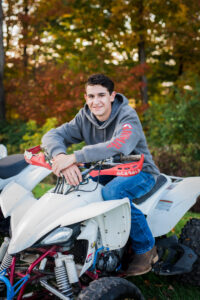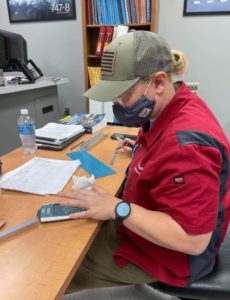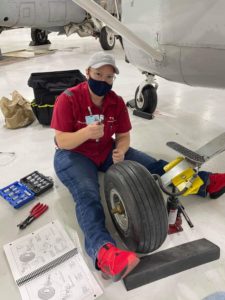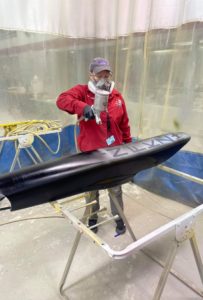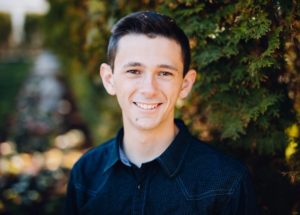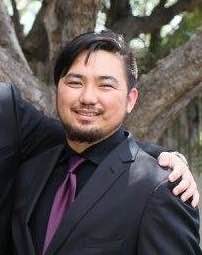Investing in New Careers Through Choose Aerospace
For years, the ARSA Annual Scholarship has been awarded through Choose Aerospace to a deserving aerospace maintenance student. Along with other aviation industry allies, the association has long been part of effort that has awarded more than $240,000 in funding, books, testing fees, and equipment to support continued education for aspiring aviators.
On Oct. 23, Choose Aerospace announced a dramatic expansion to provide greater funding while building stronger connections between educators and employers. The association encourages its members to help support this new, expansive initiative: the Choose Aerospace SkillPointe Scholarship, launched in partnership with the Aviation Technician Education Council. The new scholarship will be both to currently enrolled part 147 program students as well as high schoolers currently taking Choose Aerospace coursework, ensuring early exposure to aviation maintenance career pathways.
Organized in 2020, Choose Aerospace is a non-profit partnership providing resources to improve the availability of a diverse, qualified technical workforce. Its high school curriculum program has reached almost 1,500 students and provides foundational aerospace competency that can be a model for apprenticeships, career development resources, and recruitment pipelines for the industry.
The program will leverage the SkillPointe Foundation’s extensive national network of technical training providers and career-seeking applicants to reach a broader pool of qualified candidates. Contributors to the Fund will gain:
(1) Access to applicant data for outreach and recruitment.
(2) Visibility among aviation students and training programs.
(3) Opportunities to promote career and education pathways to a highly motivated audience.
Become a Founding Contributor to the Choose Aerospace SkillPointe Scholarship Fund and be recognized as an early champion. Download the program flyer (below) to see additional benefits. Email careers@chooseaerospace.org for more information.
ARSA has invested in...
5/22/25 - A Future Better than Yachting in the Caribbean – 2025 Scholarship Winner Daniel Lucerne
May 22, 2025

2025 ARSA Scholarship winner Daniel Lucerne sailing the Caribbean on the Motor Yacht “Vicky.” Photo courtesy Daniel Lucerne.
Meet ARSA’s 2025 Scholarship winner Daniel “Danny” Lucerne of the Atlanta campus of Aviation Institute of Maintenance. Lucerne’s interest in aviation was stoked while yachting (as crew) in the Caribbean. Now in school, he’s paying the bills with a non-certificated job at a repair station.
Lucerne’s award was made as part of Choose Aerospace’s Aviation Maintenance Scholarship and Award Program. ARSA and its partner organizations combine to provide tens of thousands of dollars’ worth of scholarships, textbooks, training systems, and testing fee credits for educators and future aviators. The association assisted in reviewing applications for all awards, an exercise sure to boost confidence in the industry’s future as the program receives submissions from excellent candidates.
Lucerne answered a few questions for ARSA’s communications team. His answers show how thoughtfully he connects his past experience to future opportunity and provide useful feedback for employers looking to show how big that opportunity is.
(1) Your scholarship application made it very clear you feel passionate for aviation but didn’t mention what brought you to the field in the first place. What got you started?
I was working in yachting and spent a lot of time in traveling the Caribbean. I was exposed to general aviation through the people I worked with, as well as my own trips to and from smaller islands. Aviation was always on my radar. I love the way it connects communities and the world, and how aerospace is constantly at the cutting edge of engineering feats. I personally enjoy mechanics and, combined with my exposure to aviation, I decided to make a shift from working at sea to working on airplanes. That’s when I applied and began my journey to become an A&P mechanic.
(2) How has the experience of working in a part 145 repair station impacted your learning experience? How is the “working world” different from the classroom or training facility?
My repair station maintains components. I overhaul valves and regulators and requalify high pressure cylinders. The school curriculum is very broad, covering airframe and powerplant systems across many types of aircraft, so much of what we learn goes beyond my specific work. It’s always satisfying when I can apply something I learned in the classroom on the job, which has happened several times.
One of the biggest differences is that,\ in the workplace you are responsible for your own learning. Part of our quality assurance is my duty to ensure I’m doing overhauls or repairs correctly according to the maintenance manual. You can’t just rely on how someone else trained you or how things have always been done. You need to be familiar with technical documents and service bulletins, ensuring you’re using the correct revisions.
My time in the classroom has helped me understand the bigger picture: why we do things a certain way, what the regulations are, and how systems work. This has definitely helped me become a better technician.
(3) What have you found to be most surprising/unexpected about AMT school?
One thing I found surprising was how varied the careers of our instructors were, especially those in aviation for decades. Some had experience with sheet metal, helicopters, turbines, reciprocating engines, or avionics. Some were very well-rounded, others specialized. It is encouraging to see the broad range of opportunities that exist for a mechanic.
(4) What are your professional goals after school? How have they been impacted by your working experience at the repair station?
Working at the repair station has helped me understand what I like and what I don’t. It’s helped me identify areas where I have strengths that I can bring to aviation. I enjoy troubleshooting and have discovered I’m good at reading and interpreting technical documents.
I’m passionate about all kinds of aviation, but general and corporate aviation particularly interest me because there are so many amazing aircraft I’d love to work on. Once I earn my A&P, I’d like to work on turboprop and jet-powered corporate and private aircraft, get my Inspection Authorization (IA) after several years, and possibly explore NDT disciplines, although that’s something I still need to learn more about.
(5) If you learned that someone was considering school/career choices and they asked you about aviation maintenance, what would you say?
I would strongly encourage it. There aren’t many careers where you can start working with just a year and a half of education and have access to as many opportunities or such good pay. Aviation is incredibly cool and if you love to nerd out about aircraft (like I do) and have that strong attention to detail, you will be a good fit.
(6) What do you think industry professionals should know in order to be most helpful in helping you and others to build aerospace careers?
Getting your foot in the door is always the hardest part for aspiring aviation mechanics. Opportunities like internships, apprenticeships or anything where you can get wrenching time are very helpful.
Another thing I’ve noticed is that clear career progression isn’t always laid out at repair stations (at least in my limited experience). It would help if newcomers could see a path from entry-level to senior mechanic, director of maintenance, quality assurance, or perhaps management. Having a clearer idea of what’s possible long-term would be very helpful for people entering the industry.
Get to know Danny even better by reviewing his application package for the ARSA Scholarship, which he agreed to share with the public. Click here to see his answers to the review committee’s questions.
To learn more about the Choose Aerospace Scholarships and Awards Program, click here.
For more information on ARSA’s broader efforts to support industry career development, visit avmro.arsa.org/careers.
Want to congratulate Daniel? Learn more about how to find great candidates like him? Contact ARSA for a referral.
6/4/24 - A Young Farmer's Wisdom – 2024 Scholarship Winner Brian Hill
June 4, 2024

ARSA 2024 Scholarship Winner Brian Hill. Photo courtesy Brian Hill.
Meet ARSA’s 2024 Scholarship winner Brian Hill of Pittsburgh Institute of Aeronautics. Hill is a third generation farmer whose hands-on learning began with his first chore assignments at age six and will undoubtedly continue through a long technical career.
Hill’s award was made as part of Choose Aerospace’s Aviation Maintenance Scholarship and Award Program. ARSA and its partner organizations combine to provide tens of thousands of dollars’ worth of scholarships, textbooks, training systems, and testing fee credits for educators and future aviators. The association assisted in reviewing applications for all awards, an exercise that is sure to boost confidence in the industry’s future as the program receives submissions from excellent candidates. Contributions like those made to the scholarship program help student’s like Hill, whose goal is to pay entirely for his own education without going into debt; he described these payments collectively as “an investment, rather than an expense.”
Hill answered a few questions for ARSA’s communications team, clearly investing time and careful thought in his responses. The association encourages its members to get to know this young technician – we can help you meet him if you like:
(1) Your family farming background was clearly a key to both your personal and skill development. How has the troubleshooting and mechanical competence you learned as a youth transferred into developing aviation knowledge?
Yes, growing up on the farm did develop my troubleshooting and mechanical competence. I was servicing and repairing a wide range of equipment: tractors, skid loaders, feed carts, lawn mowers, etc., plus my brother and I were often in the shop until late at night working on our own “toys” (trucks, cars, quads, side by sides, snowmobiles, and a homemade go-cart). We both are mechanically inclined, so we considered ourselves very fortunate to have the right facility and setup, most of the tools we needed, and access to heavier equipment (like a skid loader) to do the job right (and save money by doing it ourselves).
Gaining experience on the farm (10 years), at the Lebanon County Career & Technology Center’s Electromechanical Engineering Technology program (2 years), and with BHM Farm Equipment as a Service Technician (2 years) has presented a variety of things to work on. This has broadened my knowledge and given me more insight on how similar things really are.
So, in a very simplistic way, by understanding the basics of how anything mechanically works, all my abilities actually transfer across the board to anything else with a motor with similar principles. No matter what a person is troubleshooting, it is done systematically. So, whether it is a household item or an airplane – just having the knowledge to know how to assess and identify the solution is a similar process. When it gets way more complex is how many parts are inside the household product to make it run versus how many parts are inside a plane to make it operate… and operate safely. Another key factor in mechanical competency boils down to the man-hours put into learning the various parts, how they work, and what happens when they don’t work. That is why time in training is required for the FAA A&P Certification to ensure an aviation maintenance technician is qualified and well-versed in many areas – safety regulations, electrical systems, power plant, sheet metal, hydraulics, pneumatics, accessory systems, instrumentation and controls, and navigation systems – just to name a few.
So, whether I’m dealing with a loader boom on a tractor, mower deck and transmission on a lawn mower, or the flight controls on a plane – are all hydraulic, and the common denominator is fluid dynamics. Since I have the understanding of fluid dynamics and have had hands-on experience, it is easy to develop, build and elevate my knowledge in aviation. I also think I bring passion, dedication, and attention to detail to the table.
With any maintenance or repair, I enjoy the entire process from start to finish. I like checking into why something isn’t working properly (and making sure that nothing else went awry during the breakdown) and then having the answers to resolve the issue. So, the nose-to-tail expectations of an AMT are very attractive to me. While working with my dad on the farm, no two days were the same (which is what I would expect mirrors the aviation industry), so if every day in the hangar is different, that lights a fire inside me.
I’m excited about working with my hands, having my mind stimulated with troubleshooting challenges, and having the knowledge to resolve them — plus I will be proud that my expertise will positively impact the safety of others.
(2) What has the experience been like with your classmates, particularly in seeing the different backgrounds and pathways that brought others into aviation?
PIA classes are not too large which provides a great opportunity to interact with most classmates during instruction, in labs, the shop, and even on breaks. Even if the assignment in lab that day is one-on-one, we all end up giving input whenever the scenario allows for this exchange, so it feels like we are all on the same team and everyone rallies to help each other. Don’t get me wrong – there is still some (healthy) competitiveness going on among one another – but it is a good thing that actually pushes everyone to their fullest potential.
I was not expecting the variety of my peers’ ages, personal situations, and work backgrounds. Some have come right from high school, others came to PIA AMT school after years of service in the military, and some came from careers, both related and unrelated to the aviation industry. We have classmates with interests/experiences in automotive repair, and/or a work history as an electrician, military servicemen, teacher, and one is even an owner of a brewery who decided he wanted a change and a second career. But honestly, it usually enhances the discussion by someone having a different perspective or by those that have already been out in the workforce.
My first two semesters at PIA have been awesome! The AMT program definitely aligns well with my skills and interests, and I look forward to going to school every single day. I am forming solid friendships with several classmates, and I anticipate keeping in touch with some of my instructors that have already become mentors. It has been a great experience, and I would predict that some of my friendships could last a lifetime because of this shared experience and the interests we have in common.
(3) What have you found to be most surprising/unexpected about AMT school?
I anticipated AMT school would involve very technical, in-depth curriculum (like the ones I mentioned in the first question), as well as the obvious hands-on man-hours in the shop. But I was surprised with how broad the scope is of everything we need to learn because there are so many complicated and involved components to aviation, for example, piston and turbine engines, turbine engine designs, reciprocating engine instruments, engine fuel metering systems, engine fire detection and extinguishing systems, engine auxiliary systems, propulsion systems, fuel pumps, fabrication of fluid lines and fittings, starters and landing gear systems, propellers, powerplant lubrication systems, how to read blueprints and mechanical drawings, airframe inspection, warnings and environmental systems, non-destructive testing methods, composite materials, aircraft hardware and material identification, precision measuring techniques, aircraft corrosion control, FAA documentation, aircraft mechanic privileges and limitations, aircraft manufacturers’ specifications, ground operating rules, and airport operating procedures, etc.
It was unexpected to me that “the sky really is the limit” in the aviation industry. The A&P certification is very respected and sought after and will open the door to countless opportunities in many sectors (such as private, commercial, manufacturing, medical transport, space, maintenance, repair and overhaul, military, elevator repair, amusement parks, etc.) both nationally and worldwide.
(4) Other than working for an ARSA member company (kidding…but seriously), what are your goals for life after school?
PIA has a proven performance record, and I’m confident I will be job-ready to become an AMT. Having these credentials will give me a strong start in this in-demand industry and provide job security even when there are uncertainties in other businesses. There are constantly advances in technology, so I plan to keep my skills current to maintain the high standard that is expected, so there is only one option but to be exceptional at my job.
I am open to considering everything from working under a private repair station that is small enough to have that small town feel and know all of my co-workers well; working in a fast paced environment of line work where time is money and I can help save money; or working in a commercial airline. These collected options allow for chances at a lucrative salary, great benefits, and opportunities to advance into a supervisory or management position one day.
Some of my goals are to be considered an exemplary employee, have job satisfaction, a potential pathway for advancement (in both education and the corporate ladder), and have a good work-life balance. I believe the aviation industry could offer me a lifetime career and be fulfilling by utilizing my knowledge and abilities, giving me the opportunity to excel, and through making a difference for others with my contributions.
(5) It’s an admirable ambition to pay entirely for your own schooling and to do so without incurring Help ARSA’s members understand the value of the scholarship by sharing the expenses you have to cover while at school.
I had saved my paychecks from my last job before moving to attend PIA, sold my truck and one quad, bought a fuel-efficient car for $650 and repaired it myself so that I would have reliable transportation, and I currently work as many hours as possible at my part-time job at AutoZone to help towards my total costs, which I estimate will top $60,000 including tuition, fees, living expenses, transportation, and food, to reach my goal of paying for my own schooling and to start my aviation career debt-free. I have endured a setback with my housing (losing an initial rental because the owner sold the property, which required a less-favorable lease in another location) but I am still hopeful I will achieve what I have set out to accomplish. I see the AMT program at PIA as an investment, rather than an expense, as I know it will pay off going forward. I knew it would be challenging, and I am willing to make sacrifices along the way, so each and every scholarship is such a blessing toward these expenses. Thank you!
(6) If you learned that someone was considering school/career choices and they asked you about aviation maintenance, what would you say?
I would tell them – absolutely – go for it, you won’t regret it! But, I would also ask them why they are interested to be sure they have what it takes, which is mechanical interest/experience, strong math skills, great logical thinking, dedication and drive, willingness to put in the work, and ability to work under pressure. I would prepare them for what to expect (physically and mentally challenging work) so that they are focused and determined during the duration of the AMT program. I would also remind them that it is really hard because it is an AMT’s job to safeguard millions of travelers every day. There were 40 students at the beginning of the first semester and at the end of the second semester, my class has thinned out to about 25 students. So, it is fair to say that it is a demanding program and should be taken seriously.
(7) What do you think industry professionals should know in order to be most helpful in helping you and others to build aerospace careers?
I think it would be good for industry professionals to get the word out about the shortage of AMTs and plant the seed early to high school students about this career option. These representatives could have a presence at high school assemblies, shop classes or job fairs, plus go to Career & Technology Centers to meet with the juniors and seniors that are already interested in a trade (many of which could be relevant in aviation). Since my AMT program has a diverse age group and range of backgrounds, it might be good for aviation professionals to reach out to the military to bridge their civilian career and find ways to reach more adults that want a career change (via tv commercials, online ads, community events, fairs, etc.).
As far as AMT students already enrolled, it would be helpful for industry professionals to participate in PIA’s job fairs each semester to give us a chance to explore a day at XYZ aviation company. Because the aviation industry is so vast and has endless opportunities, it is a bit overwhelming to know where to start and how to narrow down our options. It could be worth investing the time for the company to have casual discussions outside of school with those students that have employee potential (such as over the phone, video conference, or inviting them for a tour on the weekend) before they graduate.
And I think the industry professionals sharing their stories would go a long way. It would be helpful to hear about their journey, their high points and personal milestones, but also share their pitfalls and lessons learned. It would be interesting to hear where they see the industry going and the employers’ plan for keeping AMTs current with their skills because the industry and its technology is ever-changing. This would also be a good time to discuss the possibilities of continuing education and learning about advancement opportunities within the company to supervisory and senior level positions to help me consider which path to pursue in building my career.
I believe it is important for new hires fresh out of AMT school to get adequate, hands-on training so they are clear on the company’s expectations, learn the ropes, and get questions answered so the new AMT can get up to speed quickly and begin to thrive.
Get to know Brian even better by reviewing his application package for the ARSA Scholarship, which he agreed to share with the public. Click here to see his answers to the review committee’s questions, which cover some of the same background details he shared with ARSA.
To learn more about the Choose Aerospace Scholarships and Awards Program, click here.
For more information on ARSA’s broader efforts to support industry career development, visit arsa.org/workforce.
Want to congratulate Brian? Help with his interest in gaining hands on experience? Learn more about how to find great candidates like him? Contact ARSA for a referral.
4/25/23 - Doing It All – 2023 ARSA Scholarship Winner Joel Mink
April 25, 2024
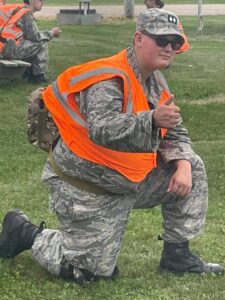
2023 ARSA Scholarship Winner Joel Mink.
In March, ARSA awarded its 2023 scholarship to Joel Mink, a first-year student in the AMT program at Cincinnati State Technical and Community College.
The grant is part of Choose Aerospace’s Aviation Maintenance Scholarship and Award Program. ARSA and its partner organizations combined tens of thousands of dollars’ worth of scholarships, textbooks, training systems, and testing fee credits for educators and future aviators. The association assisted in reviewing applications for all awards; while this year’s candidates were universally excellent, Mink’s broad interest in aerospace and commitment to maintenance skills as a point-of-entry into a long industry career made him stand out among his peers. He officially received his award during the Annual Conference of the Aviation Technician Education Council (ATEC).
Mink answered a few questions for ARSA’s communications team. His answers underscore his practical approach to learning and desire to build many skills of value to aviation businesses. The association encourages members to get to know him, not only to learn about the value of investment in the scholarship, but also to learn from the example of a future aviation professional.
(1) You’ve committed yourself to developing a broad range of experience in aviation, particularly through Civil Air Patrol, how has that effort paid off now that you’re in school?
There is no substitute for hands-on experience. I’m extremely grateful for Trego-Dugan Aviation for my first job at an airport as a ground maintenance assistant and for the Civil Air Patrol for providing me multiple opportunities to fly planes. Thanks to what I have learned through these experiences, I can better understand my AMT instructors. I can visualize what they are talking about rather than just seeing photos in a book or on a slideshow. Also, I sometimes see an issue at work and have an “aha” moment when I realize that we just learned about that in class. I would not be able to have these advantages without both my Civil Air Patrol and Trego-Dugan experiences.
(2) What has the experience been like with your classmates, particularly in seeing the different backgrounds and pathways that brought others into aviation?
Everyone has a story, and that is especially true at Cincinnati State. There are people from all backgrounds, ages, etc. However, we all work together to help each other learn the material and perform the labs. The AMT program really is a family atmosphere. Between classes we even go outside and throw a football to relax.
(3) What have you found to be most surprising/unexpected about AMT school?
The most surprising aspect about AMT school for me has been the number of recruiters coming to campus looking for A&Ps. I had read about a shortage, but I had no idea it would be so dire that recruiters would come to school and offer huge bonuses to anyone that would come work for them.
(4) Other than becoming an ARSA member (kidding…but seriously), what are your goals for life after school?
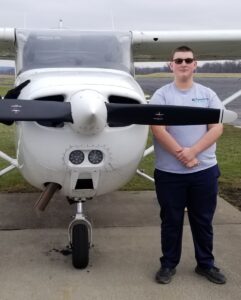
2023 ARSA Scholarship Winner Joel Mink.
My short-term goal after college is to gain more hands-on experience by working at a larger repair facility. My long-term goal is to own my own airplane repair facility for general aviation planes.
(5) To help ARSA’s members understand the value of the scholarship, tell us about the expenses you have to cover while at school.
The normal expenses are well known coming into college: Tuition, books, and fees are published by the college. What is surprising is the number of tools that I am continuing to purchase. It seems like every couple of weeks I need a specialized tool to accomplish a task required by one of my class labs, and I have learned quickly that the price of a tool increases dramatically if the word “aviation” is in front of it. Add the price of transportation (gasoline) on top of that and the expenses add up quickly.
(6) If you learned that someone was considering school/career choices and they asked you about aviation maintenance, what would you say?
To be an AMT, you absolutely must love grease. If you are afraid of hard work and getting dirty, then this field probably is not for you. If you live, breathe, and dream about airplanes then this is exactly where you belong because you will never be closer to aviation than when you have an engine apart in your work area. It is a wonderful field, but you have to go into it knowing that there are days that you will go home smelling like hydraulic fluid.
(7) What do you think industry professionals should know in order to be most helpful in helping you and others to build aerospace careers?
The hardest barrier of entry for me into the aviation industry has been finding that first AMT job. There are plenty of jobs out there for those with full A&P certifications, but the few internships/co-op positions that do not require a full A&P are not well publicized. Even the AMT recruiters that have visited my campus do not seem to know of many opportunities to gain the necessary hands-on experience required for an A&P. I have been very blessed by working at KCVG and having made numerous contacts within the local AMT community, but most students do not have this advantage.
Get to know Joel even better by reviewing his application package for the ARSA Scholarship, which he agreed to share with the public. Click here to see his incredibly thorough answers to the review committee’s questions.
To learn more about the Choose Aerospace Scholarships and Awards Program, click here.
For more information on ARSA’s broader efforts to support industry career development, visit arsa.org/workforce.
Want to congratulate Joel? Help with his interest in gaining hands on experience? Learn more about how to find great candidates like him? Contact ARSA for a referral.
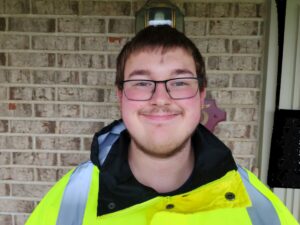
2023 ARSA Scholarship Winner Joel Mink.
9/13/21 - A Veteran at Lifelong Learning – 2021 Scholarship Winner Fawn Carrington
September 13, 2021
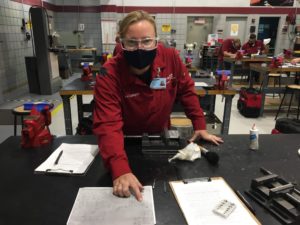
2021 ARSA Scholarship winner Fawn Carrington.
In September, ARSA awarded its 2021 scholarship to Fawn Carrington of Tulsa Technology Center. Carrington is an Air Force veteran committed to aviation education for life.
The grant is part of Choose Aerospace’s 2021 Aviation Maintenance Scholarship and Award Program. ARSA and its partner organizations combined tens of thousands of dollars’ worth of scholarships, textbooks, training systems and testing fee credits for educators and future aviators.
Carrington took the time to tell the repair station community about what’s gotten her this far and where she hopes to go. Her story reflects gratitude for the help she’s gotten and commitment to the lifelong learning needed for success in the constantly-evolving aviation world.
(1) What made you decide to pursue aviation maintenance training?
Having contributed nine years to supporting the United States Air Force as a munition’s systems technician, I was privileged to see what is involved to ensure aircraft
have what they need to complete their missions safely. I was impressed with the aircraft maintenance technicians from the first time I witnessed them hard at work. I became intrigued with the jobs they had and developed a respect for their dedication and unwavering work ethic.
(2) What experience or experiences did you have before you started at Tulsa Tech that have been most valuable to you during school?
I learned to be mechanically inclined as a teenager working on my first vehicles. I would obtain the service manuals and figure out how to do my own maintenance. Having this experience has helped me to work through my school projects with ease and to help others along the way.
(3) What have you found to be most surprising/unexpected about AMT school?
The most surprising is the usage of math in many areas of aircraft maintenance. The math is learnable, even by those who think they are “not good at math.” Everyone I have seen from all levels of experience have been able to excel at the work given.
(4) Other than becoming an ARSA member, what are your goals for life after school?
It is my goal to continue my aviation education for life whilst serving the industry in any way I can. I have an A.S. in Aerospace Administration and intend to complete my B.S. in Aviation Science following my Airframe and Powerplant certifications.
(5) To help ARSA’s members understand the value of the scholarship, tell us about the expenses you have to cover while at school.
Receiving ARSA’s 2021 scholarship has made me proud and grateful as it nearly covers my final tuition needed to complete the aviation powerplant program on schedule. The reward allows me more time to focus on my studies for upcoming certification exams.
(6) If you learned that someone was considering school/career choices and they asked you about aviation maintenance, what would you say?
If anyone has a curiosity or passion for aviation, whether they intend to obtain their private pilot’s license or not, should pursue an aviation maintenance program. It is as fun and useful as it is interesting to learn about the aerodynamics and practices involved in making these flying machines fly. The aircraft we have flying today are truly amazing and the learning never stops with changes in technology and the progress our community is making with NextGen.
To learn more about the Choose Aerospace Scholarships and Awards Program, click here.
For more information on ARSA’s broader efforts to support industry career development, visit arsa.org/workforce.
Want to congratulate Fawn? Recruit her? Learn more about how to find great candidates like her? Contact ARSA for a referral.
11/30/20 - Greasy Hands & Complex Problem Solving – 2020 Scholarship Winner C. Owen Ritzman
November 30, 2020
In November, ARSA awarded its 2020 scholarship to C. Owen Ritzman of Southern Utah University. Ritzman is an AMT student whose love of getting his hands dirty is matched only by his excitement at solving complex engineering problems.
The grant is part of Choose Aerospace’s 2020 Aviation Maintenance Scholarship and Award Program. ARSA and its partner organizations combined to sponsor more than $25,000 worth of scholarships, textbooks, training systems and testing fee credits for educators and future aviators.
Ritzman took the time to share the impact of his experiences so far and his hopes for the future. His answers to a few simple questions illustrate his curiosity and commitment to hard work; a story that began in his father’s garage and will hopefully continue in shops or hangars for decades to come.
(1) What made you decide to pursue aviation maintenance training?
When I was five or six years old, my dad bought a new truck and invited me to help him put the running boards on. I can’t imagine that I was really any help, but I specifically remember being so proud that I had gotten grease on my hands from helping. I colored black spots on my hands with crayon for a few days so that I could show all of my friends how cool it was!
As I got a little older, I told my parents that I wanted to be a car mechanic. They lovingly suggested that I keep that as a hobby. Through high school, I went through a lot of different degree and career plans. Engineer, national park ranger, wildlife biologist and even helicopter pilot. I quickly discovered that the last one made me sick. But when I was investigating piloting at Southern Utah University, I discovered the newly founded AMT program and that quickly proved to be the answer to my love of mechanical work and my desire to not be limited to an auto shop for my whole life.
(2) What experience or experiences did you have before you started at SUU that have been most valuable to you during school?
I would consider two things of most value to me prior to my experience here at SUU. The first is the countless hours I spent in the garage with my dad or on my own, learning the ins and outs of how cars worked. Without that basis of how tools work, how engines work, and how to problem solve, I would be lost in aviation.
I would say the critical thinking I was able to learn in high school is of even more value, however. Aircraft require a higher level of precision than anything I ever wrenched on in my driveway. Being able to have the mathematical, reading, writing and communication skills I learned through high school have been invaluable to me in AMT school. Though I wouldn’t have entered this field without my mechanical background, I would never last without the critical thinking ability.
(3) What have you found to be most surprising/unexpected about AMT school?
Before I started AMT school, I didn’t realize how fragile aircraft actually are. As I have had the chance to work hands-on, I have discovered just how easily something very important and very expensive can break. I had always imagined aircraft being tough, solid, and hard to break, but mindlessly pushing on the wrong thing can do extensive damage.
Because of this, we spend much more time in classroom instruction than I ever expected. I came prepared for an environment where we would rarely be in lecture but quickly realized that without that time, we would be wasting precious resources once we actually began hands-on work. It was well worth the wait too!
(4) Other than becoming an ARSA member, what are your goals for life after school?
Of course, at my age, plans are constantly changing, but my biggest goals after I finish my schooling are to be able to support a family and live somewhere that I can admire every day. One of the most attractive things to me about working with aviation was the amount of versatility it offers. There is work to be had all across the country. Granted, young inexperienced workers often have to take what they can get. But I am confident that as I gain more and more experience, this field will lead me to the exact places that I want to be.
(5) To help ARSA’s members understand the value of the scholarship, tell us about the expenses you have to cover while at school.
In all honesty, in AMT school, expenses rack up quickly! I was fortunate enough to be offered an academic scholarship from SUU that covers a large part of my standard tuition. However, because of the amazing access we have at SUU to hands-on learning, the fees associated with classes add up to about 160 percent more than an average student would be paying here.
Another thing that added up very quickly was tools. Despite spending hours working on cars, most of the tools I used were not mine. I would estimate that I have already invested about $1,200 in tools. Some of these are very basic, cheap tools to get me through school, and others are high-end precision tools like torque wrenches.
On top of all of this, there are normal living expenses: gas, groceries, rent, car repairs, dates, recreation, etc. Scholarships like the one offered by ARSA make a huge difference in mitigating these expenses. They make it possible to afford the education while still taking care of everything else. And trust me- the money you pay is well worth the education!
(6) If you learned that someone was considering school/career choices and they asked you about aviation maintenance, what would you say?
If someone was considering aviation maintenance, I would tell them that it’s a pretty fool-proof option. There will always be work in this field, so long as they are willing to do just that— work! But even more enticing, it provides an opportunity to do genuinely important tasks every single day. There are few feelings better than seeing your own effort and knowledge put into action. And what better way for it to be in action than flying through the air?
To learn more about the Choose Aerospace Scholarships and Awards Program, click here.
For more information on ARSA’s broader efforts to support industry career development, visit arsa.org/workforce.
Ritzman’s inspiration at work…
9/22/16 - Professional Inspiration - 2016 ARSA Scholarship Winner Tony Tran
September 22, 2016
In March, the Northrop Rice Foundation announced that the 2016 ARSA Scholarship had been awarded to Tony Tran of Chaffey Community College in Rancho Cucamonga, California. Tran was selected out of 37 applicants to receive the association’s annual award.
There is a satisfaction for me when I make a repair. The only way I can describe it, is by comparing it to the feeling an artist gets when he or she completes a painting. I treat every job I do like it’s my masterpiece. – Tony Tran
Photo courtesy Tony Tran.
ARSA caught up with Tran this month to ask him about his life, career and aspirations. His inspirational responses illustrate the commitment to duty of AMTs around the world:
What made you decide to pursue aviation maintenance training?
I always felt a connection to aviation since I was young. It started with my dream to become a pilot after I saw a plane for the first time. In fact, I boarded that plane when I traveled from Vietnam to the United States. In high school, I discovered my aptitude for science and math so I thought engineering was the best route for a career. I went to college, while at the same time served in the United States Marine Corps Reserves. While in the Marines, I worked as a helicopter mechanic and I simply enjoyed the work I did with these flying machines. Engineering did not give me as much joy, so I dropped out of a University Engineering program and went to [Chaffey] community college for its AMT program.
There is a satisfaction for me when I make a repair. The only way I can describe it, is by comparing it to the feeling an artist gets when he or she completes a painting. I treat every job I do like it’s my masterpiece. I take particular care in my actions, and always make sure I do every job right to the book. Yes, it is frustrating. Yes, it is hard. However, I prefer to do this than sit in any office.
What experience or experiences did you have before you started at Chaffey that have been most valuable to you during school?
Aside from my experiences in the military, I believe my experience at Cal Poly, San Luis Obispo was most valuable. There I learned the importance of time management, and picking what you love to do rather than picking something that you’re good at. Some people are fortunate enough to be good at something they love. However, for me, I did not have a love for Engineering, even though I was good at it.
During my time at Cal Poly, I learned that you can always get better at something, but you cannot learn to love something. I may not be the greatest mechanic, but I sure do enjoy fixing things.
What have you found to be most surprising/unexpected about AMT school?
I found that the education at my AMT school to be even better than that at a university. The instructors can convey and explain information just as well or even better than professors. They understand students a little better, and they can use that understanding to change up their teaching method as new generations of students come into their classrooms. Just because the degree or certificate can be perceived [by those outside the industry] as lesser than a bachelors’ degree, it doesn’t mean that the education received is any less.
Other than becoming an ARSA member, what are your goals for life after school?
After my certificate, I hope to work as a mechanic for an airline for a period of time. Furthering my education would still be on my mind. One way or another, I would work towards a bachelors’ degree in a field that has to do with aviation. Then one day, I would work towards a Masters’ degree, return to the education environment and to pass on my experience and knowledge to the next generation.
To help ARSA’s members understand the value of the scholarship, tell us about the expenses you have to cover while at school.
Asides from education tuition, student fees, and the costs of books being in an AMT program requires students to buy tools as well. In addition to tools, I would need to pay for my Airframe and Powerplant Written Exams and Oral/Practical Exams. The expenses I mentioned earlier are purely for my education, but in addition to those expenses, I have to take reduced time at work in order to go to school. That means, I would need to rely on Financial Aid, Scholarships, and Grants to pay for rent and other bills while I attend school. Those are the unforeseen expenses of going to school.
NOTE: Scholarship money is primarily for tuition and fee payment, with the student receiving any remainder funds from their school. Assistance with tuition payment frees up student funds – or limits debt burden – to cover other expenses.
If you learned that someone was considering school/career choices and they asked you about aviation maintenance, what would you say?
I would say aviation maintenance is a dynamic and growing industry. At the same time, aviation maintenance gives you a sense of duty. In my experience so far as a student and as a former helicopter mechanic, the jobs can change day to day. Furthermore, the industrial technology is growing so fast that there are new ways to perform our jobs every year.
People all over the world rely on aircraft for transportation, recreation and mission support. The uses of aircraft expand as time moves forward, and again technology feeds into the aviation industry continuously with this aspect as well. Jet liners are becoming more fuel-efficient and can carry more and more people. Flying has almost become the most practical way to travel. With more people taking to the skies, it is our duty to make sure they’re safe up there. That is our duty as aviation mechanics.
Anything else?
First of all, I would like to thank ARSA for the help they have provided for me. Most importantly, ARSA supports several students each year, and I would like to thank your organization for that as well. I mentioned earlier that this world needs aviation mechanics, and many people dream of working on aircraft. Any contribution that ARSA makes has already made a huge impact for students everywhere and the aviation industry.
I know because it certainly has made a difference for me.
4/2/15 - 2015 ARSA Scholarship Winner – Paul Mart, ERAU
April 2, 2015
On Mar. 4, the Northrop Rice Foundation announced the 2015 ARSA Scholarship had been awarded to Paul Mart of Daytona Beach, Florida. Mart is an AMT student at Embry Riddle Aeronautical University (ERAU).
Mart is pursuing a Bachelor of Science in Aviation Maintenance with a concentration in maintenance management in addition to minors in aeronautical studies and flight. Before arriving at ERAU, Mart earned credits at Green River Community College and the University of Colorado, Boulder.
Mart has a passion for advancements in industry-leading avionics and an interest in business aviation. His goal is to someday be Director of Maintenance at a corporate flight department, but Mart understands the work ahead and looks forward to it. Crediting his parents, who immigrated to the United States from Romania, with teaching him invaluable lessons about hard work and sacrifice, Mart has a clear vision of where he’s going and what it will take to get there.
“It is clear that Paul will be a leader in the industry,” noted one of his instructors in a recommendation letter. “He has all the right characteristics that will help him be a great mechanic and [give him] the desire to grow.” Those characteristics, outlined across all of Mart’s recommendations, include effective personal skills, a meticulous nature and the highest level of integrity.
In short, Mart will be a great asset to the aviation maintenance community and the flying public. It is for people like him that ARSA supports this annual scholarship through NRF; those that will grow the industry, uphold the highest ideals of its work and keep the world safe in flight for years to come.





